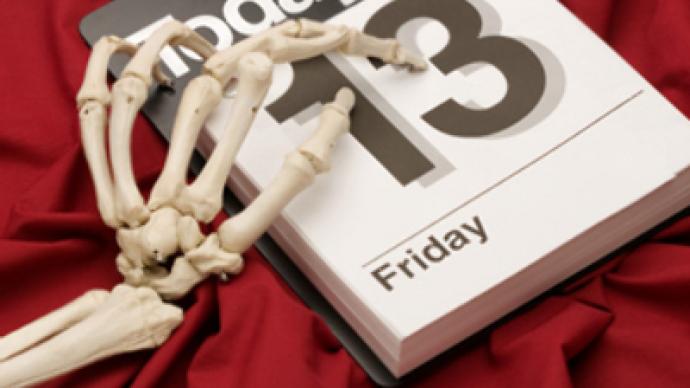Economic crisis to worsen with three Fridays 13 in a year?

When the world is gripped by economic crisis, a record three Fridays 13 a year has given people another reason to be worried. Last time it happened Russia was hit by a major default.
The 1998 economic crisis was one of the gravest ones in the history of Russia, when the national currency the rouble devalued, a lot of banks and small businesses went bankrupt and foreign investors lost confidence in Russian banks and authorities.
The previous ‘year of maximum Fridays 13’ was no better, and that time the financial disaster was global.
It was in 1987 when, on the notorious ‘Black Monday’, the markets crashed throughout the world, causing the largest one-day percentage decline in history.
Back then, analysts labeled it as a black swan event, as nothing indicated that the collapse was coming. The debates concerning its cause are still under way.
Another example is 1914, when World War I started.
Nevertheless, statistics shows that years, when there are three Fridays 13, do not stand out from all others in terms of major crashes and disasters, Russian website newsru.com says.
Triskaidekaphobia – the fear of the number 13
Many people have an irrational fear of things or events associated with the number 13 and there’s even a special term for it – ‘triskaidekaphobia’.
Psychologists say those who suffer from it end up looking for trouble themselves, rather than any trouble actually happening to them. This fear is echoed in many cultures. When it unites with the ‘unhappy Friday’ superstition, the term is even more long-winded – ‘paraskavedekatriaphobia’.
There are several most popular versions of why Friday is considered to be the unhappiest day of the week. It is believed that:
- Christ was crucified on Friday;
- Adam was created on Friday, he and Eve ate the forbidden fruit on Friday and later both died on a Friday;
- Kain killed his brother Abel on Friday.
The fact that Friday was the Hangman Day in Britain and a day for executions in ancient Rome has likely added to the dislike.
As for the number 13, there are many more reasons:
- Ancient Hebrews thought 13 was unlucky because the thirteenth letter of their alphabet is the letter M. It is the first letter in the word ‘mavet’ which means death;
- In Scandinavian lore Loki, the god of evil, started a riot when he crashed a banquet at Valhalla attended by 12 other gods;
- According to the Bible, Jesus Christ's Last Supper was attended by 13 people;
- It was believed that witches' Sabbaths were attended by 12 witches and the 13th one was the Satan.
In some cultures like ancient Egypt and the Maya civilization this number was in fact considered to be a lucky one.
According to the research of the SuperJob.ru website, out of 2,000 polled, only one in a hundred Russians fear Friday 13, Interfax news agency reports. At the same time, every fourth European is afraid of Friday 13.
For Americans, their fears are connected more with the number 13 itself.














